
Cairo contains a number of synagogues, though only a handful of Jews remain. As of December 2022, there were 12 remaining synagogues but only 3 native Egyptian Jewish inhabitants in the city. [1]

Cairo contains a number of synagogues, though only a handful of Jews remain. As of December 2022, there were 12 remaining synagogues but only 3 native Egyptian Jewish inhabitants in the city. [1]
The Egyptian Jews constitute both one of the oldest and youngest Jewish communities in the world. The historic core of the indigenous community consisted mainly of Arabic-speaking Rabbanites and Karaites. After their expulsion from Spain, more Sephardi and Karaite Jews began to emigrate to Egypt and their numbers increased significantly with the growth of trading prospects after the opening of the Suez Canal in 1869. As a result, Jews from all over the territories of the Ottoman Empire as well as Italy and Greece started to settle in the main cities of Egypt, where they thrived. The Ashkenazi community, mainly confined to Cairo's Darb al-Barabira quarter, began to arrive in the aftermath of the waves of pogroms that hit Europe in the latter part of the 19th century. In the late 1950s, Egypt began to expel its Jewish population (estimated at between 75,000 and 80,000 in 1948), [2] also sequestering Jewish-owned property at this time. In 2016, the spiritual leader of the Jewish community in the city of Cairo, Magda Tania Haroun, stated that there were 6 Jews remaining in the city, all women over the age of 65. [3] In July 2019, there were only 5 Jews left in Cairo, [4] while in 2022 it was reported that there were only 3 left. [1] It's estimated that only 18 Egyptian Jews remain in the entire country, with most of them in the city of Alexandria.[ citation needed ]

The Ben Ezra Synagogue (in Hebrew : בית הכנסת בן עזרא; in Arabic : معبد بن عزرا) sometimes known as the El-Geniza synagogue (in Hebrew: בית כנסת אל גניזה) or the synagogue of the Palestinians, is in the old neighborhood of Cairo, in Egypt. [5]
The Ets Hayim Synagogue (in Hebrew : בית הכנסת עץ חיים; in Arabic: معبد حنان) is a synagogue located in the capital of Egypt, Cairo. The temple was built in 1900. The synagogue is located in Daher district. The marble floor of the temple was damaged during the earthquake of October 12, 1992. The synagogue is protected by the Egyptian supreme antiquity council. The temple is guarded by a police officer. The synagogue was used for the last time in 1967. [6]
The Maimonides Synagogue (in Hebrew : בית הכנסת הרמב"ם) (transliterated: Beit HaKneset HaRambam: (in Arabic: كنيس ابن ميمون) also known as the Rav Moshe synagogue is a historic synagogue located in Cairo, Egypt. A synagogue has existed in the area since the 10th century and was later called by the name of the famous Jewish philosopher, rabbi and doctor Maimonides, after his arrival, around 1168, as a result of his exile in Córdoba, Spain, at the hands of the Almohades. [7] It is believed that the original tomb of Maimonides is located within the building. In March 2010, the Egyptian government completed the restoration of the current building, which dates from the end of the 19th century.
The Sha'ar Hashamayim Synagogue (in Hebrew: שער השמים; in Arabic: كنيس عدلي) is located in the city of Cairo in Egypt. The synagogue was also known as Ismailia Temple and the synagogue at Adly Street. His historical leader was the great rabbi Chaim Nahum. In 2008, the synagogue celebrated its 100th anniversary. [8] The synagogue was built in a style similar to the ancient Egyptian temples, and once it was the largest building on the boulevard. [9]

A synagogue, also called a shul or a temple, is a place of worship for Jews and Samaritans. It has a place for prayer where Jews attend religious services or special ceremonies such as weddings, bar and bat mitzvahs, choir performances, and children's plays. They also have rooms for study, social halls, administrative and charitable offices, classrooms for religious and Hebrew studies, and many places to sit and congregate. They often display commemorative, historic, or modern artwork alongside items of Jewish historical significance or history about the synagogue itself.

The Aleppo Codex is a medieval bound manuscript of the Hebrew Bible. The codex was written in the city of Tiberias in the tenth century CE under the rule of the Abbasid Caliphate, and was endorsed for its accuracy by Maimonides. Together with the Leningrad Codex, it contains the Aaron ben Moses ben Asher Masoretic Text tradition.

Egyptian Jews constitute both one of the oldest and one of the youngest Jewish communities in the world. The historic core of the Jewish community in Egypt mainly consisted of Egyptian Arabic speaking Rabbanites and Karaites. Though Egypt had its own community of Egyptian Jews, after the Jewish expulsion from Spain more Sephardi and Karaite Jews began to migrate to Egypt, and then their numbers increased significantly with the growth of trading prospects after the opening of the Suez Canal in 1869. As a result, Jews from many territories of the Ottoman Empire as well as Italy and Greece started to settle in the main cities of Egypt, where they thrived. The Ashkenazi community, mainly confined to Cairo's Darb al-Barabira quarter, began to arrive in the aftermath of the waves of pogroms that hit Europe in the latter part of the 19th century.
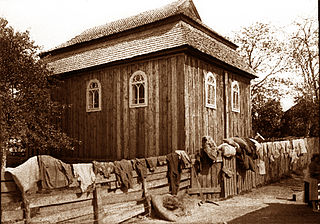
A kenesa is an Eastern European or Persian Karaite synagogue.

Abraham Maimonides was the son of Maimonides and succeeded his father as nagid of the Egyptian Jewish community.

Syrian Jews had predominantly two origins: those who inhabited Syria from early times and the Sephardim who fled to Syria after the expulsion of the Jews from Spain and Portugal in 1492 CE. There were large Jewish communities in Aleppo, Damascus, and Qamishli for centuries. In the early 20th century, a large percentage of Syrian Jews immigrated to British Mandate-Palestine, the U.S. and Latin America.

The Four Sephardic Synagogues are a complex of four adjoining synagogues located in the Jewish Quarter of the Old City of Jerusalem. The four synagogues include the Eliahu Ha'navi Synagogue, the Yochanan ben Zakai Synagogue, the Istanbuli Synagogue, and the Emtsai Synagogue formed from a courtyard amidst the synagogues that was roofed in the mid-18th century.

Zarzis Synagogue also known as Beit HaKnesset Mishkan Ya’akov, is located in the coastal town of Zarzis, Tunisia. It was built in around 1900 when the Jewish community of Zarzis numbered approximately 1,000. An arson attack in 1982, following Sabra and Shatila massacre in Lebanon, left the synagogue and Torah scrolls totally destroyed. It was subsequently rebuilt and is currently used by the town's remaining 100 Jews.
The Asmara Synagogue is the only surviving remnant of the Jewish community in Eritrea. Built in 1906, includes a Jewish cemetery, classrooms, and a main sanctuary. All aspects of the synagogue today are taken care of by Samuel Cohen, an Asmara native who remained in the country to look after the edifice.

The Ben Ezra Synagogue, sometimes referred to as the El-Geniza Synagogue or the Synagogue of the Levantines (al-Shamiyin), is situated in the Fustat part of Old Cairo, Egypt. According to local folklore, it is located on the site where baby Moses was found.

The Sha'ar HaShamayim Synagogue is located in Cairo, Egypt. The synagogue was also known as Temple Ismailia and the Adly Street Synagogue.
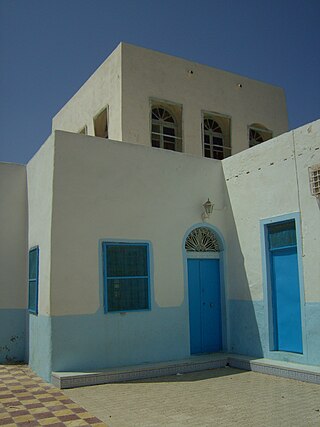
The Synagogue of the Priests of Djirt is a synagogue located in Hara Kbira "Greater Neighborhood", the Jewish neighbourhood located on the outskirts of Houmt El Souk, on the Tunisian island of Djerba.

The Shfaram synagogue is an ancient synagogue located in the Israeli-Arab city of Shfaram, Northern Israel.

This article deals in more detail with some of the notable synagogues of Jerusalem that do not have their own page as yet.

The Maimonides Synagogue, also known as the Rav Moshe Synagogue, is a historic synagogue located in Cairo, Egypt. A synagogue has existed at the site since the 10th century and was subsequently named after the famous Jewish philosopher, rabbi and physician Maimonides, after his arrival there in around 1168. It is believed that Maimonides' original tomb is contained within the building. In March 2010, the Egyptian government completed the restoration of the current building which dates from the late 19th century.
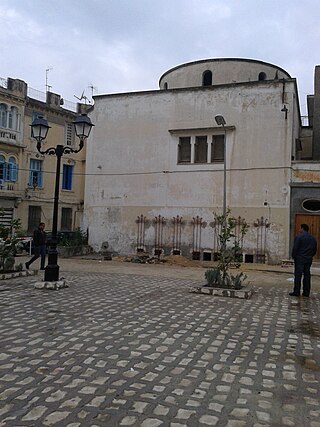
The Or-Thora Synagogue is a synagogue located in the Hara of the city of Tunis.

The Isaac Ben Walid Synagogue is a synagogue in the mellah of Tetuan, Morocco.

The Moses Ben Maimon Synagogue is a synagogue located in Abu Dhabi, United Arab Emirates. The synagogue was officially opened on February 17, 2023, and is named after the 12th century Jewish philosopher Moses Ben Maimon. The synagogue is the first public synagogue in the United Arab Emirates. It is a part of the Abrahamic Family House complex.
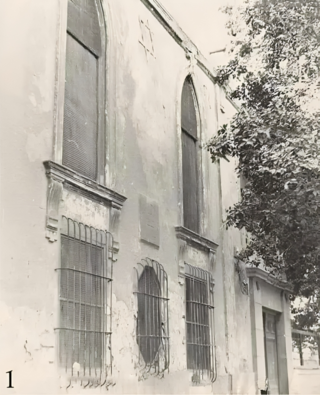
Helwan Synagogue, also known as Beit Aharon Temple, was a Jewish synagogue located in Helwan and the first synagogue in Khedivate of Egypt. The small building was established in 1892 as a center for the Jewish community.
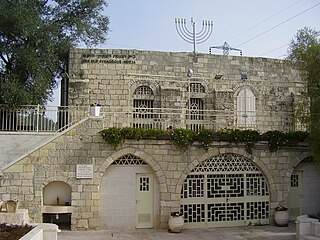
The Old Motza Synagogue is an Ottoman-era synagogue located in Motza in West Jerusalem off of Highway 1.